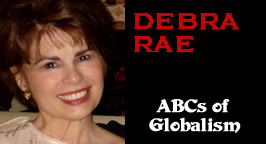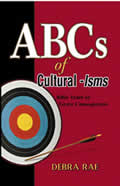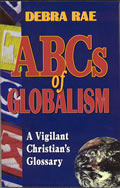POLITICS OF INTERNATIONAL DIFFUSION: OUR COMMON FUTURE
By
Debra Rae
May 4, 2013
NewsWithViews.com
“It’s one-world now”—so said Leslie Gelb on the Charlie Rose Show (4 May 1993). President emeritus of the Council on Foreign Relations, Dr. Gelb concedes that transnational paradigm shift is well underway.[1] Indeed, the language of globalism is so deeply ingrained in American culture that definitions, and agendas supporting them, attract little attention beyond a knowing nod of placid approval. Whereas “national sovereignty,” “free enterprise capitalism,” and “traditionalism” are eschewed as “snarl” words, folks affirm as “purr” words “globalization,” “harmonization,” and “sustainability.”
“International Diffusion” Purrs Pretty
To study a broad range of inter-related topics, professors, practitioners, and students from around the world recently gathered in San Francisco for the Fifty-fourth Annual Convention of the International Studies Association. Added to more than five thousand convention attendees were representatives from universities, non-profit organizations, publishing companies, and businesses from near and far. The ISA is a United Nations-recognized, nongovernmental organization[2] that links directly to major UN conferences through which life altering global policies are determined.
The theme of this April 2013 convention—i.e., international diffusion —purrs pretty. A respectably scientific term, “diffusion” is the physical process whereby individual particles within a fluid move randomly from high concentration to lower concentration areas until, in the end, they’re distributed evenly throughout the space. In like fashion, with equality its intended outcome, political-cultural diffusion spreads linguistics and cultural practices/ innovations from one community to another.
Given Robin Hood-style wealth diffusion, America’s unprecedented “economic revolution” is fast fading under the shadow of global socialism. Absent a tangible utopia, hopeful humans tend to seek an ideological counterpart. Enter, universal enlightened production,[3] called “god-money in action” (Randall Baer). Purportedly guided by an inner voice, a worker bee need only “follow his bliss” to produce whatever product or service will be best—and, therefore, in great demand—for the global community.
Egalitarian Political-Economic Liberalism
Of course, there is no historical precedence for universal enlightened production, and the track record for socialism remains dismal at best. Still, the ISA convention vigorously proselytized spread of political-economic liberalism across national borders with bogus promise of sustainable production and consumption, social justice, population control, and dispersion of power to a broader G-20.[4] Unfortunately, in the words of Henry Lamb (publisher of Eco-Logic), their one-world, would be utopian state will result ultimately in America’s taking on “the lowest common denominator that forced equity demands.”
One-world Reality, Not the American Dream
Be sure the one-world reality is no friend to our constitutional republic. Internationalists[5] dis sovereignty of nation-states[6] and require cosmic citizens to pledge their allegiance to a world community[7] restructured around natural eco-systems[8] (with surprisingly mystical nuances).[9] Federalized global government redistributes the world’s resources,[10] thereby concentrating wealth and power into the hands of few.[11]
Opportunistically poised to manage masses, global elitists easily convert unenforceable “soft law” into enforceable international law.[12] First, however, compliant masses must embrace a collectivist mindset.[13] In general, private property must be viewed as impossible; free enterprise, as exploitation; technology as an abomination against nature; and Western culture as the root of evil.[14] To accomplish this, history must be re-written to skew or ignore contributions of the West and the proverbial American Dream.
ISA: Its Sway
While not momentous, the ISA convention nonetheless showcased international studies on diffusion to be carried out (or blocked, as the case may be) by far-reaching governments, nongovernmental organizations, social movements, and multinational corporations.
• Diffusion Blocker: National Sovereignty
Essentially identifying who’s in control, national sovereignty denotes independence from outside intrusion. Internationalists wrongly denigrate this principle diffusion blocker “as a shield for cruel and socially devastating internal conflicts, all undertaken as a sovereign right.”[15] In contrast, detractors with phony promise of universal egalitarianism[16] advocate altered regional boundaries expressly designed to herald communized global governance.
• Diffusion Blocker: Free Enterprise Capitalism
Rapid diffusion of bilateral and pluri-lateral trade and investment agreements allegedly ensures open economies between and among democracy-friendly regions; however, the scheme requires Western consumerism[17] and free enterprise to cease and desist. “Diffusionists” believe it unfair for profits to bypass individuals from among the world’s have-nots to feed the coffers of “greedy” private enterprises.
• Diffusion Blocker: Religious Thinking
Professor of political science (University of California, Irvine), Cecelia Lynch is the ISA representative to the United Nations and, hence, its voice. An interfaith scholar and religionist, Lynch champions legitimacy, justice, and order; however, she unfairly pairs violent exclusionism, expansionism, and Colonial brutality with “religious thinking.”[18] Moreover, Lynch draws heavily from historian, journalist, and international relations theorist E. H. Carr. In the 1930s, Carr mischaracterized Hitler as leader of a "have-not" nation struggling for economic justice. A realist, then later a Marxist, Carr moved increasingly to the left of center while envisioning a new international order.
| Subscribe to the NewsWithViews Daily News Alerts! |
ISA Call to Action
As policy makers interacted with scholars to flesh out what the twenty-first century global order looks like, ISA cross-discipline discussions energized new, upcoming global leaders. More than forty awards presented at the conference inspired direct action.[19] Keep in mind that contending approaches for affecting diffusion extend beyond education and emulation to include coercion as well.
Samuel Adams got it right: "If ever a time should come, when vain and aspiring men shall possess the highest seats in government, our country will stand in need of its experienced patriots to prevent its ruin."[20] To that, fellow citizens, I say, “Be warned: The fat lady is fixing to sing.” Freedom-loving Americans best shake complacency, stand strong, and vigorously withstand onslaught of global tyranny.
Our kids’ future depends on it.
� 2013 Debra Rae - All Rights Reserved
Footnotes:
1.
Leslie
H. Gelb, Accessed 28 March 2013
2.
NGOs (Nongovernmental Organizations)—Private, non-elected special
interest groups serving as management behind the UN concept of sustainable
development. Only the United Nations designates official NGOs, which
are acquiring legal status to manage inter/national, state, and local
government under ultimate enforcement of the UN. The UN is currently
designating NGOs in every community.
3.
David A. Noebel, Understanding the Times: The Religious Worldviews of
our Day and the Search for Truth (Colorado Springs: Colorado: Summit
Ministries, 1996), 319-322.
4.
ISA's
55th Annual Convention, Accessed 28 March 2013
5.
Internationalists perceive themselves to be among an enlightened elite
uniquely qualified to manage masses under rule of enforceable international
law.
6.
Harmonization—Breakdown of national sovereignty.
7.
Collectivism—Bio-centric, politically correct “group think.”
8.
Bio-regionalism restructures society around natural ecosystems designed
to eliminate state and national boundaries. It has been proposed that
the United States be divided into 21 bio-regions.
9.
Gaia/Ge Hypothesis - In Greek mythology, Gaia or Ge is goddess
of the earth. Her worship undergirds ancient mystery religions, New
Age theology, and radical environmentalism. James Lovelock was a British
scientist who, in the 1970s, elaborated the Gaia Hypothesis by identifying
Gaia-Earth as a living, interconnected eco-system deserving human apology
for existing on the planet as a “cancer” or “virus.”.
10.
“Globalization” speaks to redistributing the world’s
resources under the UN principle of sustainable development. Raw materials
(including people) are considered the common property of the world.
11.
Global Brain Trust–Through his San Francisco World Forum, internationalist
Mikhail Gorbachev selected what he calls the Council of the Wise, consisting
of one hundred innovative thinkers supposedly qualified to guide global
interests.
12.
“Soft” Law—specifically, unenforceable agreements
among nations on the international stage. Because international agreements
appear to represent consensus, they eventually evolve into enforceable
international law. Take, for example, global agreements, conventions,
pacts, declarations, treaties, summits, and executive orders.
13.
George Hegel (1770-1831) was a German philosopher who undermined the
notion of fixed rights or wrongs; in fact, he believed that “the
State is God.” Hegelian Dialectic is conflict resolution (or the
Delphi Technique) toward group agreement under peer pressure. Accordingly,
today’s PC agenda supersedes all other considerations. Its united
causes include civil/ gender/ sexual orientation rights and radical
environmentalism, which together define the proper mindset of global
citizenry relating to the new world order.
14.
A New Earth (Global Civic) Ethic must supplant the Judeo-Christian one.
In fact, all emblems of traditionalism must be undermined, be it biblical
belief, state and national constitutions, and Western notions of the
traditional family. Instead, a new religious base for the masses must
be established. Enter, neo-pantheistic syncretism, which muddles the
“narrow way” of Christianity with universalism, humanism,
and Eastern Philosophies. Ostensibly giving overriding priority to the
world’s poor, internationalists purpose to control population
in terms of (1) numbers and (2) lifestyle options.
15.
John Kenneth Galbraith [leading economist]. A Journey Through Economic
Time: A Firsthand View (New York: Houghton Mifflin, 1994), p. 240.
16.
Sustainable Development is the UN’s central organizing ruling
principle, its three “E’s” being environment, economy,
and equity. According to Dr. Beverly Lahaye of Concerned Women of America,
sustainable development is a specious term the UN uses to say that wealth
and resources must be redistributed; and populations must be controlled.
17.
Consumerism (perceived as the primary threat to earth’s resources)
is the targeted enemy of sustainability and, even at the price of forfeiting
personal liberty, must be reduced.
18.
Cecelia
M. Lynch, Accessed 28 March 2013. Public Education is a powerful
disciple of humanism and effective means for nurturing illumined, politically
correct global citizens, perceived as human resources for the emerging
new world order in a new age of group consciousness
19.
ISA's
55th Annual Convention, Accessed 28 March 2013
20.
Liberty
Quotes, Accessed 28 March 2013.












 Share
This Article
Share
This Article





